| Srl | Item |
| 1 |
ID:
111827
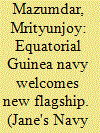

|
|
|
| 2 |
ID:
053546
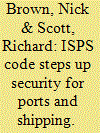

|
|
|
| 3 |
ID:
165118
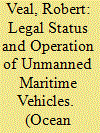

|
|
|
|
|
| Summary/Abstract |
The number of unmanned maritime vehicles (UMVs) and their potential applications in the marine space are growing constantly. Because of their comparatively small size and limited operations, only modest attention has been paid to how they fit into the international legal framework. Many UMVs may not be considered to fall under the definition of "ship" so as to enjoy states' rights of navigation under UNCLOS. Therefore states, manufacturers, and investors remain uncertain about the rights and obligations regarding UMV operations in the various maritime zones. This article addresses these questions for a range of UMVs with differing levels of autonomy. It argues that the international legal framework delegates the question of whether a UMV is a ship or not to the flag state's national laws. The article suggests that such a determination will be binding on other states. With respect to UMVs that do not fall under the definition of ship, there is remaining uncertainty about whether any navigational rights in the jurisdictional zones of other states are available, while it is argued that such rights do exist in the areas beyond national jurisdiction. The article also considers the extent to which today's UMVs can comply with the international framework for ensuring safety at sea. For those UMVs falling under the definition of ship, compliance with the current regulatory framework for shipping is required and compliance will be more difficult as the level of UMV autonomy increases.
|
|
|
|
|
|
|
|
|
|
|
|
|
|
|
|
| 4 |
ID:
137610
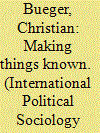

|
|
|
|
|
| Summary/Abstract |
How are international phenomena rendered knowable? By which means and practical devices is international knowledge generated? In this article, I draw on the case of contemporary maritime piracy to introduce a research framework that allows these questions to be addressed. Arguing that the practices of international knowledge generation are poorly understood, I show how concepts from science and technology studies provide the tools to study these practices empirically. Relying on the practice theory of Karin Knorr Cetina, I introduce the concepts of epistemic infrastructures, epistemic practice, and laboratories and demonstrate how they facilitate interesting insights on knowledge generation. I investigate three “archetypes” of epistemic practices in detail and show how these generate knowledge about piracy for the United Nations. The three archetypes are the quantification practices of the International Maritime Organization, the interpretation work of a monitoring group and the network of a special adviser. The article introduces an innovative agenda for studying knowledge generation in international relations by focusing on the practical epistemic infrastructures, which maintain knowledge about international phenomena.
|
|
|
|
|
|
|
|
|
|
|
|
|
|
|
|
| 5 |
ID:
132142
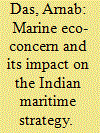

|
|
|
|
|
| Publication |
2014.
|
| Summary/Abstract |
Maritime strategic planning cannot be done in isolation of marine eco-concerns. Marine species are known to perceive the environment around them through acoustic signals, and depend on sound for numerous functions like foraging, communication and navigation. Noise as a pollutant has found scant reference in the United Nations Environmental Programme (UNEP) document of 1982-the United Nations Convention on the Laws of the Seas (UNCLOS). The International Maritime Organization (IMO) is yet to include noise as a pollutant in its 1978 MARPOL Convention. The enthusiasm for so-called economic growth and related activities in the absence of a regulatory framework encourages indiscriminate rise in such activities and the resultant increase in the anthropogenic noise, with disastrous impact on the acoustic habitat. A more inclusive maritime strategy is thus called for. In this article, the author presents a unique dimension for Indian maritime strategy.
|
|
|
|
|
|
|
|
|
|
|
|
|
|
|
|
| 6 |
ID:
059797
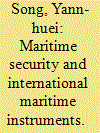

|
|
|
| 7 |
ID:
117945
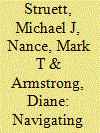

|
|
|
|
|
| Publication |
2013.
|
| Summary/Abstract |
Maritime piracy is one of the oldest subjects of international law and recently it has reemerged as a serious threat to commerce and security. While states have become more engaged in punishing and preventing piracy, efforts as a whole have been poorly organized, ad hoc, mostly unilateral, slow to develop, and only minimally effective. This is true despite the existence of a regime complex that supposedly promotes effective cooperation on the issue. What explains the insufficient response to this rising economic and security threat? This article argues that the regime complex itself is a major part of the problem. It examines specifically four core elemental regimes that are identifiable by their key texts or organizations: the UN Convention on the Law of the Sea, the Convention for the Suppression of Unlawful Acts Against the Safety of Maritime Navigation, the International Maritime Organization, and the International Maritime Bureau. This analysis adopts a perspective that emphasizes how these different legal and organizational institutions shape actors' understandings of piracy, and thus their interests in it, in conflicting ways. Different elemental regimes push different actors toward different behaviors.
|
|
|
|
|
|
|
|
|
|
|
|
|
|
|
|
| 8 |
ID:
106155
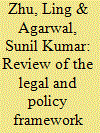

|
|
|
| 9 |
ID:
103777
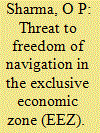

|
|
|
| 10 |
ID:
130253
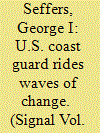

|
|
|